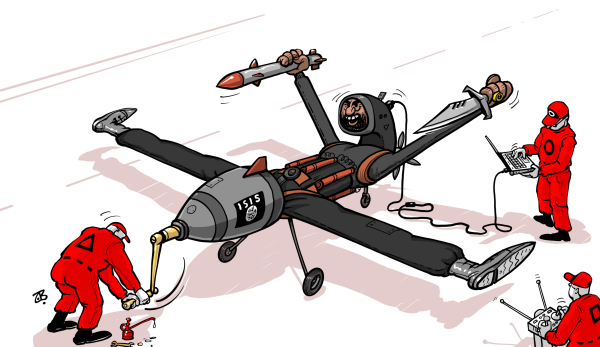
Are we back to fighting the Global War on Terror?
The attack in a Moscow concert hall that killed 144 people last month should be a wake-up call to the whole world, especially with the Olympics coming this summer in Paris. It is thought that four members of ISIS-K, an Afghanistan-based branch of the Islamic State of Iraq and Syria, were able to conduct the bombing despite US and Iranian intelligence warnings provided to Russian security services.
This came on the heels of bombings in Iran in January killing nearly 100 people, for which ISIS also claimed responsibility, and other assaults this year in Afghanistan, Pakistan and across Africa.
For a decade, the Islamic State conducted brazen attacks throughout the Middle East and Europe, and inspired sympathizers to try to do so in the US. ISIS troops were able to gain control of a huge swath of territory throughout Syria and Iraq, peaking in 2015 with control of millions of people and fielding tens of thousands of well-trained fighters. Ultimately, the need to stabilize the Iraqi government, along with gruesome videos of ISIS forces beheading western hostages and burning alive a captured Jordanian pilot, galvanized an international effort to destroy the group.
A global coalition of over 70 nations led by the US first pushed them from the outskirts of Baghdad. By 2019, the coalition had wrested control of nearly all the territory ISIS controlled and killed its leader, Abu Bakr al-Baghdadi. But the loss of terrain did not stamp out terrorists' ability to conduct deadly operations. Like a forest fire that has been largely contained, there is always the danger of a reflash from the embers still on the ground.
How dangerous is today's Islamic State, and what can we do to fully defeat it?
The first step is obvious: We need to realize that the threat is far from over. ISIS is a dedicated, religiously motivated organization full of zealots that will continue to find support from disaffected and radicalized portions of the world. The terrorists will gravitate toward ungoverned and weakly governed places such as Afghanistan, the grey zone between Iraq and Syria, the southern islands of the Philippines, and sub-Saharan Africa.
Unfortunately, there are rich targets around the world, despite two decades of improvements in homeland security following the 9/11 attacks. In addition to large public venues as in the Moscow attack, there are concerns ISIS could focus on cruise liners, holiday markets in major cities, college graduation ceremonies and humanitarian operations (the floating pier being built by the US to bring relief to beleaguered Gaza needs to be well guarded). The French government, recognizing the potential vulnerabilities, just put out a request for thousands of police officers from more than 45 nations that are sending sports teams to the summer Olympics.
Another key part of a US strategy to defeat ISIS will be working with allies, partners and friends. The existing intelligence networks involving NATO allies in Europe and treaty allies in the Pacific (Japan, South Korea, the Philippines, Australia, New Zealand and others) provide shared levels of information on Islamic State activities. Beyond our alliance systems, strong partners who could be attacked — including Israel, Colombia, Singapore, India, Saudi Arabia, the United Arab Emirates, Oman and Bahrain — will be willing to work more tightly with us against ISIS.
The paradox is that international sharing of intelligence will have to include partnering, at times, with nations that are adversaries in other contexts. When I was NATO's supreme commander, I had serious and productive talks with senior Russian officials — including the head of their armed forces — about cooperating on counterterrorism. Other nations with whom we have deep disagreements, including Afghanistan under the Taliban, have serious motivation for working with the West in defeating organized terrorists.
We should carefully and prudently find ways to share some intelligence and foil Islamic State plots directed against civilians in such countries. The US tried to warn Russia last month, but tensions over the war in Ukraine no doubt led to mistrust in Moscow.
We also need to improve interagency cooperation Washington. While sharing has vastly improved since 9/11, there are still gaps and seams between agencies, cabinet offices, Congress and the White House. We need a standing interagency task force to refocus attention on the Islamic State and its branches and allies, working alongside the National Counterterrorism Center. We've had such initiatives before, but given the returned emphasis on great-power competition with China and Russia, they have received less support, attention and talent.
Finally, ISIS will continue to proselytize, recruit, train and organize over social networks. Last week, retired US General Frank Mackenzie, a former leader of US Central Command — which has principal responsibility for combatting the Islamic State on the ground — warned of increasingly dangerous recruiting inside the US. Even as ISIS lost physical territory, its leaders rapidly improved their internet prowess — from criminal online funding schemes to elaborate websites designed to attract new recruits.
We have work to do in strategic communication and online engagement. We need to reenergize counter-ISIS propaganda on the internet, and have our cyberwarriors take down their websites and direct traffic to our counterprogramming. Likewise, our cyber efforts have to be capable of defeating their offensive cyber activities and foiling their online money networks.
Heightened awareness of a still-existent threat; better cooperation with allies, partners, friends and even adversaries; tightened interagency vigilance; and more effective strategic communication and cyber-defenses will all be key to defeating a resurgent Islamic State. Let's get all this in place before the juiciest target of all — the Paris Olympics — begin in July.
(COMMENT, BELOW)
Stavridis is a Bloomberg columnist. He is a retired U.S. Navy admiral and former supreme allied commander of NATO, and dean emeritus of the Fletcher School of Law and Diplomacy at Tufts University. He is also an operating executive consultant at the Carlyle Group and chairs the board of counselors at McLarty Associates.
Previously:
• 02/21/24 Ukraine's military reset is doomed without more US aid
• 12/21/23 US-led Naval force might not end Houthi ship attacks
• 11/22/23 Send America's floating hospitals to Gaza
• 11/08/23 What the US should do about Iran
• 08/30/23 Haiti needs a new UN mission, this time led by the US
• 08/16/23 To stop Iran's threat to Gulf ships, send the Marines
• 07/28/23 NATO convoys can protect Ukraine's grain harvest from Putin
• 07/28/23 Sweden and Finland give NATO an Arctic opportunity
• 07/11/23 US military's recruiting woes are a national-security crisis
• 06/02/23 Ukraine war may become a proving ground for AI
• 05/16/23 Iran's tanker seizures may bring U.S. convoys back to the Gulf
• 05/08/23 Sudan rescue mission is helping the US Navy prepare for war
• 05/01/23 Ukraine is running out of ammo. So is the US
• 03/10/23 The US military must create a Cyber Force
• 12/07/23 Putin will carpet-bomb Ukraine unless the West acts
• 10/14/22 Putin's campaign of terror from the air is already failing
• 09/08/22 Iran reveals how its naval warfare is changing
• 08/02/22 US needs a global alliance against Russia's cyberattacks
• 06/28/22What to expect from NATO's new strategic concept
• 04/13/22 Nukes? Ukraine war's most potent weapon may be a cell phone
• 01/18/22 Russia is pushing Finland and Sweden toward NATO
• 10/20/21 What Colin Powell taught me about war and optimism
• 09/14/21 Why the U.S. Navy is hunting pirates off Africa
• 07/29/21 Cuba and how Biden can avoid another Mariel boatlift
• 07/01/21 Donald Rumsfeld never gave in
• 02/16/21 Keeping troops in Afghanistan makes America safer
• 08/19/20 Military reasons to celebrate the Israel-UAE deal
• 07/02/20 Taliban bounties would be a new low even for Putin
• 01/02/20 May the 'Space Force' be with you
• 08/02/19 What Iran will do next, and how to stop it
• 05/06/19 The 'Five Eyes' intelligence-sharing alliance should expand, starting with Israel and Japan
• 04/24/19 Sri Lanka attacks mark the birth of terrorism 3.0
• 01/14/19 Iran's tiny navy is trying to revive the Persian Empire
• 06/04/18 US was right to give China's navy the boot
• 06/04/18 Big winner of Colombia's election is the US
• 05/17/18 Great power politics is back as U.S. aims at Russia with resurrected Navy fleet
• 03/20/18 Fake advice for Putin's fake win


 Contact The Editor
Contact The Editor
 Articles By This Author
Articles By This Author